< Back
10 Best AI Tools for Research and How to Use Them To Get The Best Results
Declan Gessel
Sep 20, 2024
Writing an essay can be challenging, especially when wading through an ocean of information. You know the drill: you need reliable sources to support your arguments, but finding them can become its marathon. That's where AI comes in. As technology advances, tools designed to make research easier are becoming more accessible. This guide will guide you through the ten best AI tools for research and how to use them to find sources for essay efficiently.
One standout tool is Jotbot's source finder. It helps you pinpoint the best references for your work, freeing up time for more critical tasks.
Table Of Contents
What are AI Research Tools?

AI tools have completely changed how we do research, giving us incredible speed, accuracy, and access to information. These smart-systems use advanced algorithms and machine learning techniques to help researchers with tasks like data analysis and literature reviews. By automating tedious and time-consuming tasks, AI tools let researchers focus on higher-level thinking, creativity, and innovation.
The Benefits of Using AI in Research are Huge
Boosting Efficiency
AI tools can make tasks like data collection, cleaning, and analysis much faster, allowing researchers to spend more time on meaningful work. For example, AI-powered natural language processing tools can quickly analyze large amounts of text data and find key themes, concepts, and patterns.
Improving Accuracy
AI algorithms can spot patterns and trends in data that humans might miss, leading to more trustworthy findings. For instance, machine learning models can analyze complex datasets to find subtle relationships and correlations that human researchers might overlook.
Better Access to Information
AI-powered search engines and databases can help researchers find relevant information faster and more efficiently, even from massive datasets. These tools can also help organize and manage research materials, making it easier for researchers to stay focused.
Discovering New Insights
AI can find hidden relationships and correlations in data, leading to new insights and breakthroughs in different fields of study. For example, AI-powered image analysis tools can help researchers identify new species of plants or animals, while AI-driven simulations can model complex systems and predict future outcomes.
This article will explore the best AI tools available for research, provide tips on using them effectively, and discuss what to consider when adding AI to your research process.
Understanding AI Research Tools
AI research tools are software applications that use artificial intelligence techniques to help researchers with various tasks. These tools range from simple data analysis tools to advanced machine learning platforms. They are designed to automate repetitive and time-consuming tasks, allowing researchers to focus on more complex and creative aspects of their work.
Here Are Some Common Types of AI Research Tools
Natural Language Processing (NLP) Tools
These tools help researchers analyze text data, including extracting keywords, identifying sentiment, and summarizing documents. For example, NLP tools can analyze social media data to understand public opinion on a particular topic or identify trends in scientific literature.
Data Mining Tools
These tools find patterns, trends, and relationships within large datasets. For instance, data mining tools can identify customer segments, detect fraud, and predict future outcomes.
Machine Learning Platforms
These platforms provide a framework for building and training machine learning models, which can be used for tasks like prediction, classification, and clustering. For example, machine learning platforms can develop predictive models for stock prices, medical diagnoses, and customer churn.
Visualization Tools
These tools help researchers visualize data and identify patterns that may be hard to see otherwise. For instance, visualization tools can create interactive charts and graphs, assisting researchers in communicating their findings more effectively.
Simulation Tools
These tools can create virtual environments for testing hypotheses and exploring different scenarios. For example, simulation tools can model the spread of diseases, simulate climate change, and test the performance of new engineering designs.
Applications Across Various Fields
AI research tools can be used in a variety of fields, including:
Social Sciences
It analyzes text data, studies social networks, and predicts human behavior. NLP tools can analyze historical documents to understand social trends, while data mining tools can study social networks to identify influential individuals and communities.
Natural Sciences
Machine learning platforms can analyze genomic data to identify genetic mutations associated with diseases, while simulation tools can model the effects of climate change on ecosystems. These tools can be used to analyze biological data, understand climate change, and discover new materials.
Engineering
For designing new products, optimizing processes, and predicting system failures. Machine learning platforms can develop predictive maintenance models for industrial equipment, while simulation tools can test the performance of new engineering designs.
Medicine
It analyzes medical images, develops new drugs, and predicts disease outcomes. Machine learning platforms can analyze medical images to detect cancer, while simulation tools can model disease spread and test the effectiveness of new treatments.
By understanding the different types of AI research tools and their applications, researchers can choose the right tools for their specific needs and improve their research productivity and efficiency.
Related Reading
• How To Find Good Sources
• Using AI For Research
• Citing ChatGPT
• How To Find Academic Sources
• How To Cite AI In MLA
• AI For Research Paper Writing
• Essay Sources
• AI In Academic Writing
• Most Reliable Sources For Research
• How To Get ChatGPT To Cite Sources
How to Conduct Research With AI Tools

Define Your Research Question
Start by getting clear on what you want to explore. This means crafting a specific research question that guides your study. Think of it as your North Star. It helps you choose the right AI tools and datasets. A precise question sets the stage for everything from data collection to analysis.
Gather and Prepare Your Data
Collecting data is more than just grabbing info. You need accurate, clean, relevant data to answer your research question. This requires time spent on cleaning and preprocessing to ensure quality. The goal is to have data that truly represents what you're investigating.
Select the Right AI Tools
Choosing the right AI tools is crucial. Look for tools that match your research goals and the type of data you have. Consider the tool's capabilities, ease of use, and how well it works with your current setup. Evaluate different options to find the best fit. The right choice can make a big difference in your research efficiency.
Explore and Analyze Your Data
Use AI tools to explore, visualize, and analyze your data. Look for patterns and insights that answer your research question. Try out different tools and techniques to find the most effective approaches. This step is about experimenting and seeing what works best for your data.
Interpret and Validate Your Findings
Once you've gathered insights, take the time to interpret your findings. Validate your results using additional methods or data sources. This can help ensure your conclusions are reliable. Consider potential biases or limitations and address any uncertainties.
Communicate Your Results
Now, it's time to share your findings. Use AI tools to create clear, engaging visualizations that make your results easy to understand. Write reports, give presentations, or publish your work. Effective communication is critical to making an impact in your field.
Best Practices for Using AI Tools
To make the most of AI tools, follow these best practices. Choose the right tools for your research question and data. Clean and prepare your data to ensure accuracy. Validate your results to avoid bias or misleading conclusions. Be aware of tool limitations and interpret findings cautiously. Stay informed about new developments in AI to stay ahead of the curve.
Leverage Jotbot's AI writing assistant to streamline your research process. Join over 500,000 writers, students, teams, and researchers using Jotbot to write more intelligently and faster. Start finding sources that are accessible with Jotbot's source finder today. Sign in with Google and get started in seconds.
Related Reading
• Reference Finder
• Best AI For Research
• How to Cite AI
• AI For Literature Review
• Websites Like Google Scholar
• AI That Cites Sources
• Best Academic Search Engines
• Academic Research Software
• How To Use Chat GPT For Research
• Best Research Tools For Students
10 Best AI Tools for Research
Research is the backbone of innovation, and AI tools are here to supercharge that process. Let's explore some of the best AI tools to help you conduct your research. These tools streamline data analysis, model building, and deployment, offering various solutions to your research needs.
1. Jotbot: Your Research Assistant
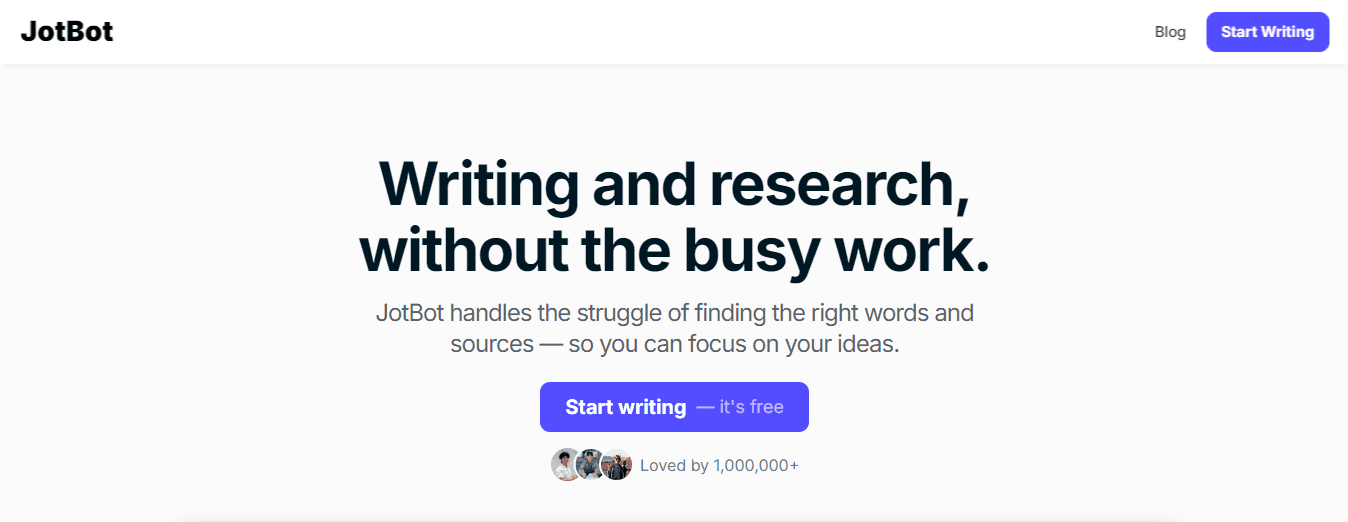
Jotbot is an AI writing assistant designed to simplify your research life. It offers features like AI note-taking, video summarizing, citation finding, and essay writing. Imagine having a tool that finds sources and helps you organize and write your research. Write more innovatively, not harder, with Jotbot's AI writing assistant. Start finding sources that are accessible with Jotbot's source finder today. Sign in with Google and get started in seconds.
2. IBM Watson Studio: Advanced AI Solutions
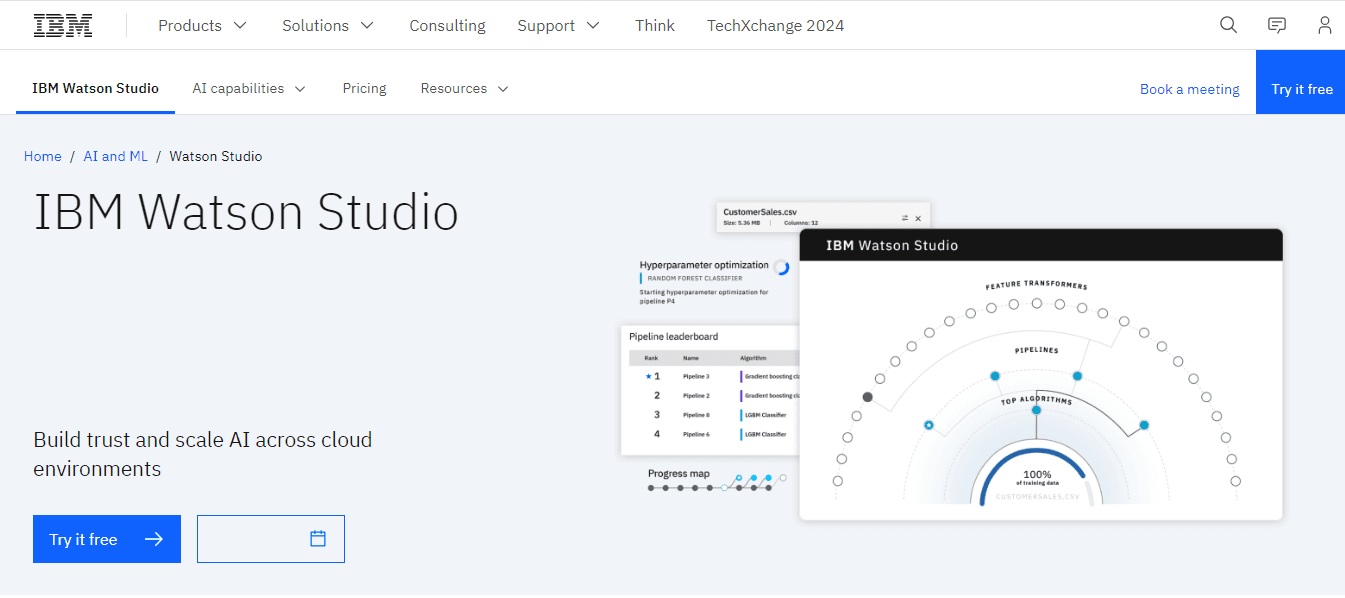
IBM Watson Studio is a cloud-based platform offering machine learning tools. It's ideal for researchers working on complex data tasks. Whether exploring data or deploying models, Watson Studio has got you covered.
3. Azure Machine Learning: Streamlined Research
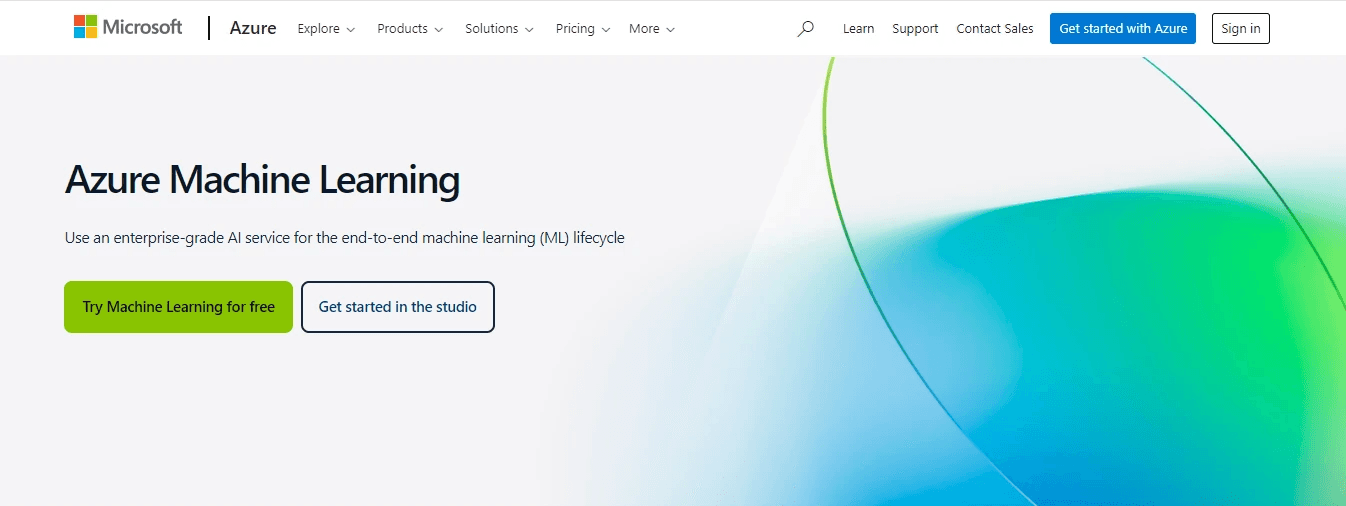
Azure Machine Learning is a comprehensive platform that provides various tools for data exploration, model building, and deployment. It's an excellent choice for researchers working on multiple tasks.
4. Amazon SageMaker: Powerful Machine Learning
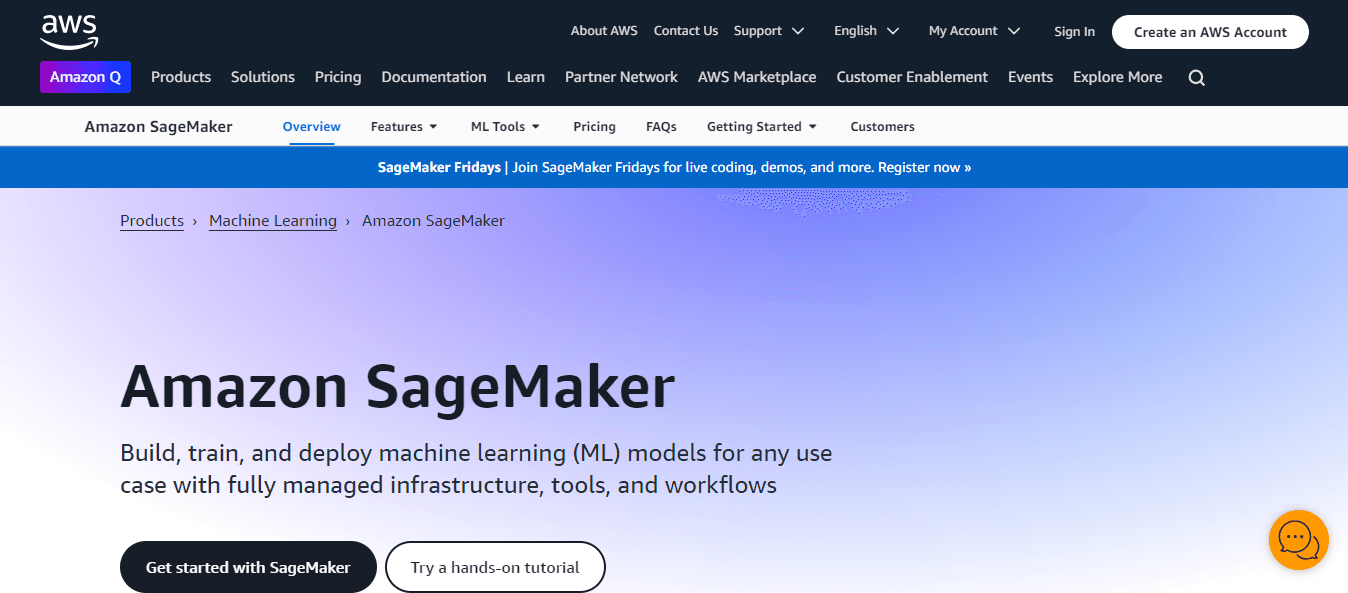
Amazon SageMaker is a fully managed machine learning platform offering tools for data exploration, model building, and deployment. It's perfect for researchers tackling complex projects.
5. RapidMiner: Simplifying Data Mining
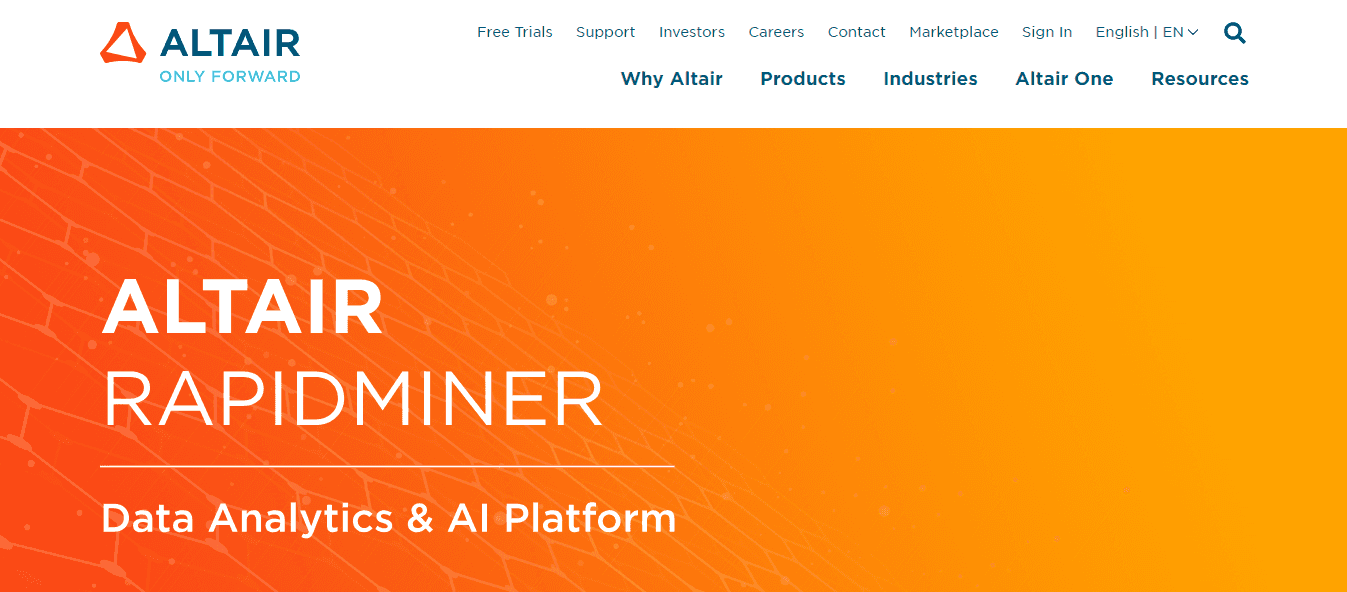
RapidMiner is a platform that simplifies data mining and machine learning tasks. It offers tools for data preparation, model building, and deployment, making it a versatile choice for researchers.
6. KNIME Analytics Platform: Versatile and Easy to Use
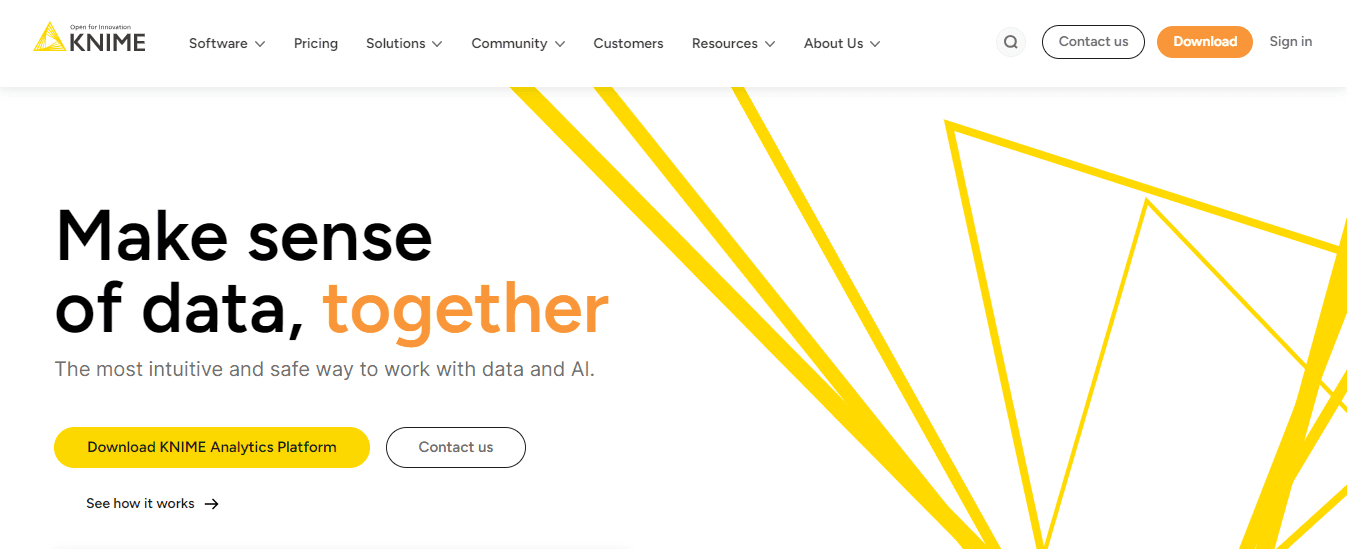
KNIME Analytics Platform provides various tools for data analytics and machine learning. It suits researchers working on multiple tasks, from data preparation to model deployment.
7. TensorFlow: Open-Source Machine Learning
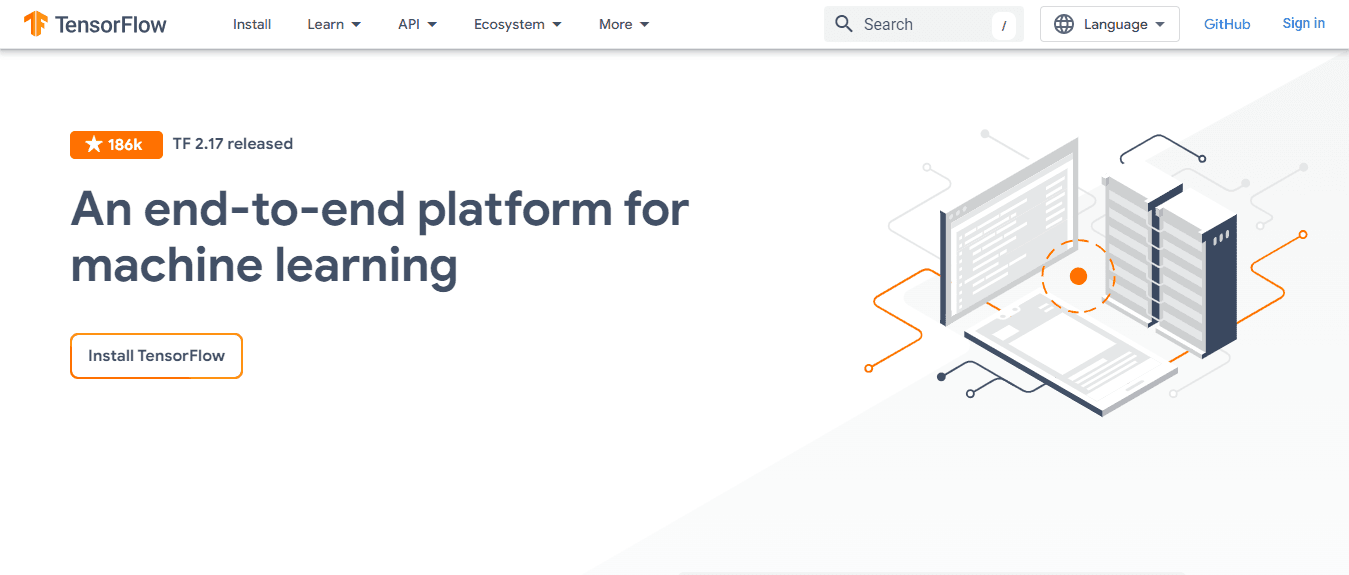
TensorFlow is an open-source framework that offers natural language processing, computer vision, and predictive analytics tools. It's a go-to choice for researchers working on machine learning projects.
8. PyTorch: Flexible and User-Friendly

PyTorch is another open-source framework that provides tools for natural language processing, computer vision, and predictive analytics. It's known for its flexibility and ease of use, making it a popular choice among researchers.
9. Jupyter Notebook: Interactive and Collaborative
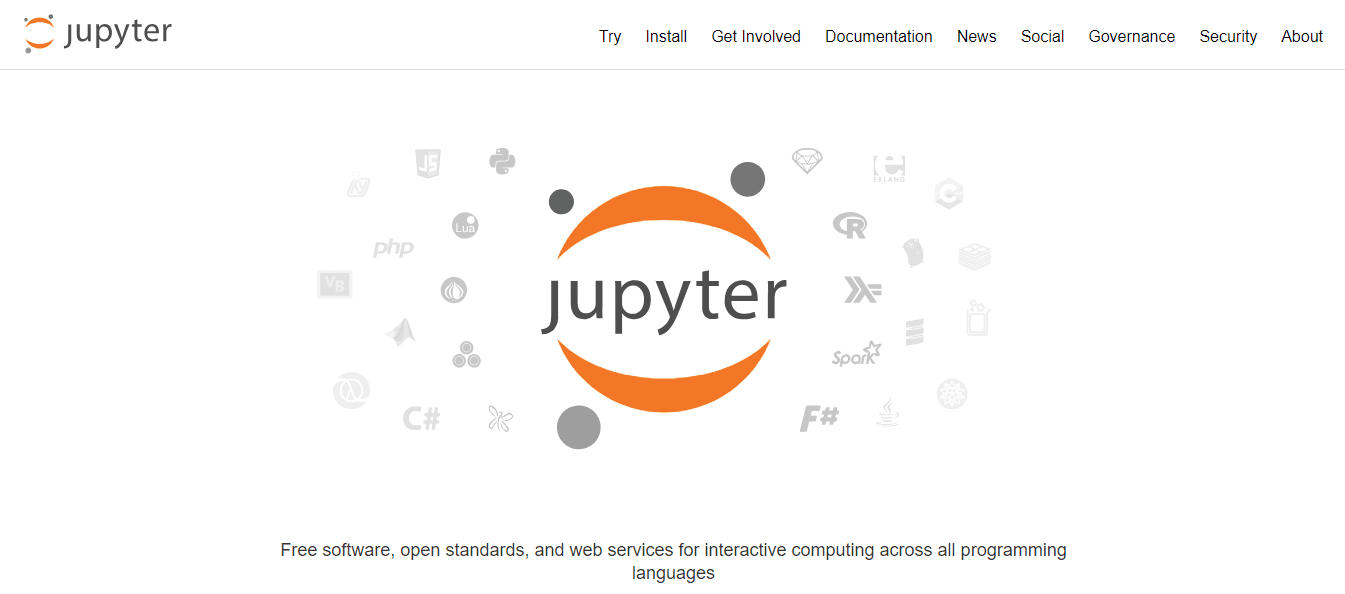
Jupyter Notebook is an open-source web application that allows researchers to create and share documents containing live code, equations, visualizations, and narrative text. It's perfect for collaboration and data analysis.
10. MATLAB: Robust and Comprehensive
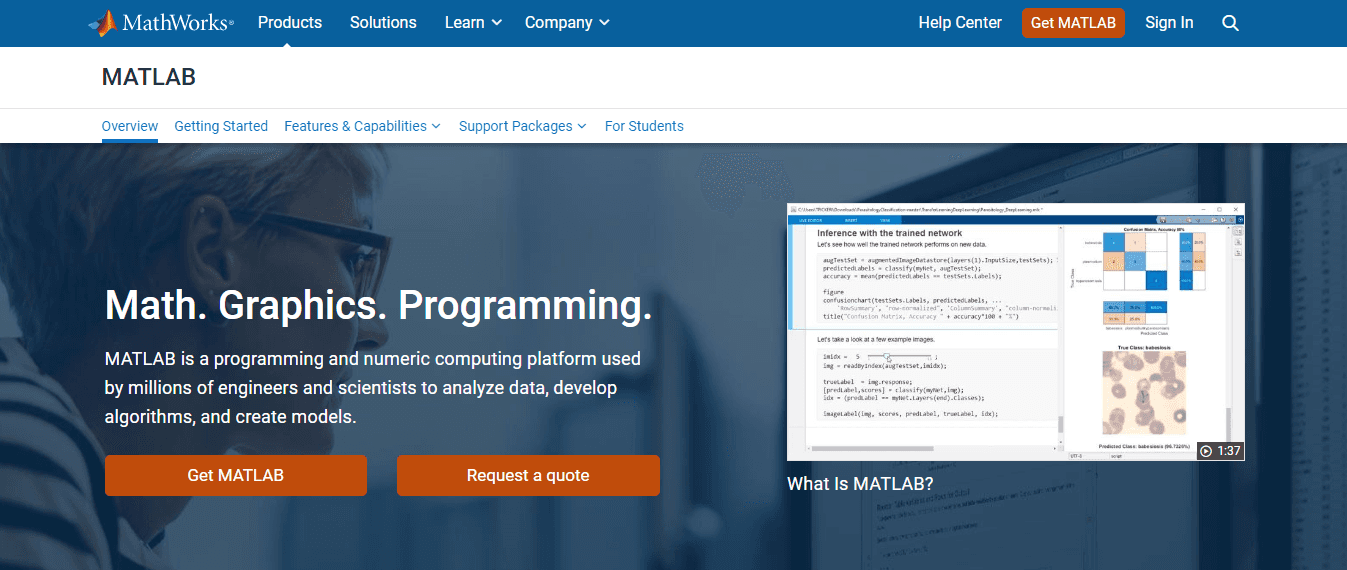
MATLAB is a proprietary programming language and environment that offers data analysis and machine learning tools. It's beneficial for tasks involving numerical computations and simulations.
These AI tools are designed to streamline your research process, allowing you to focus on what matters most: your work. Experiment with different tools to find the ones that best suit your needs.
Factors to Consider When Using AI Tools

When using AI tools for research, it is crucial to consider the following factors to ensure the quality and reliability of your findings:
Data Health Check: Keeping It Accurate and Complete
Data Quality and Reliability
Accuracy: Ensure your data is clean and correct. Only accurate information can skew results, making your research reliable. Imagine working with a dataset with wrong dates or measurements, and it’s like building on a shaky foundation.
Completeness: Make sure your data is complete. Missing pieces can introduce biases, hindering your findings. For example, if some customers skip a satisfaction survey, your analysis might not capture the true picture.
Relevance: Only use data that fits your research question. Irrelevant data wastes time and effort. For example, if you are studying education and income, skip the shoe sizes.
Bias: Watch for any slants in your data. A biased dataset can warp results, making them less representative. If your data mainly comes from one demographic, your findings might not apply broadly.
Steering Clear of Misinformation and Bias
Misinformation and Bias
Fact-checking: Double-check AI-generated info against trusted sources. AI can err, so cross-referencing is crucial. If an AI claims a scientific discovery, verify it with peer-reviewed papers or reliable news.
Bias awareness: AI models can inherit biases from their training data. Know how this might affect your work. For example, if trained on data from a specific region, the AI might lean towards that area.
Critical thinking: Don’t just accept AI outputs at face value. Analyze and question them. If an AI predicts a stock’s value will rise, weigh this against factors like the company’s performance and industry trends.
Cross-Checking and Verification: Get Your Facts Straight
Cross-Checking and Verification
Multiple sources: Confirm your findings with various sources. Relying on one can introduce bias and reduce reliability. Were you using an AI to analyze social media? Check across platforms for a fuller view.
Human judgment: Blend AI results with human insight. AI can spot patterns, but humans assess their significance. An AI might see a correlation, but a human evaluates its meaning and causality.
Validation: Test your results with other methods or data. This adds credibility to your research. If you use AI to predict customer churn, compare the results to real churn data.
By considering these factors, researchers can ensure the quality and reliability of their research findings when using AI tools. Combining the strengths of AI and human intelligence allows for more accurate and insightful research.
How Jotbot Can Help With Research
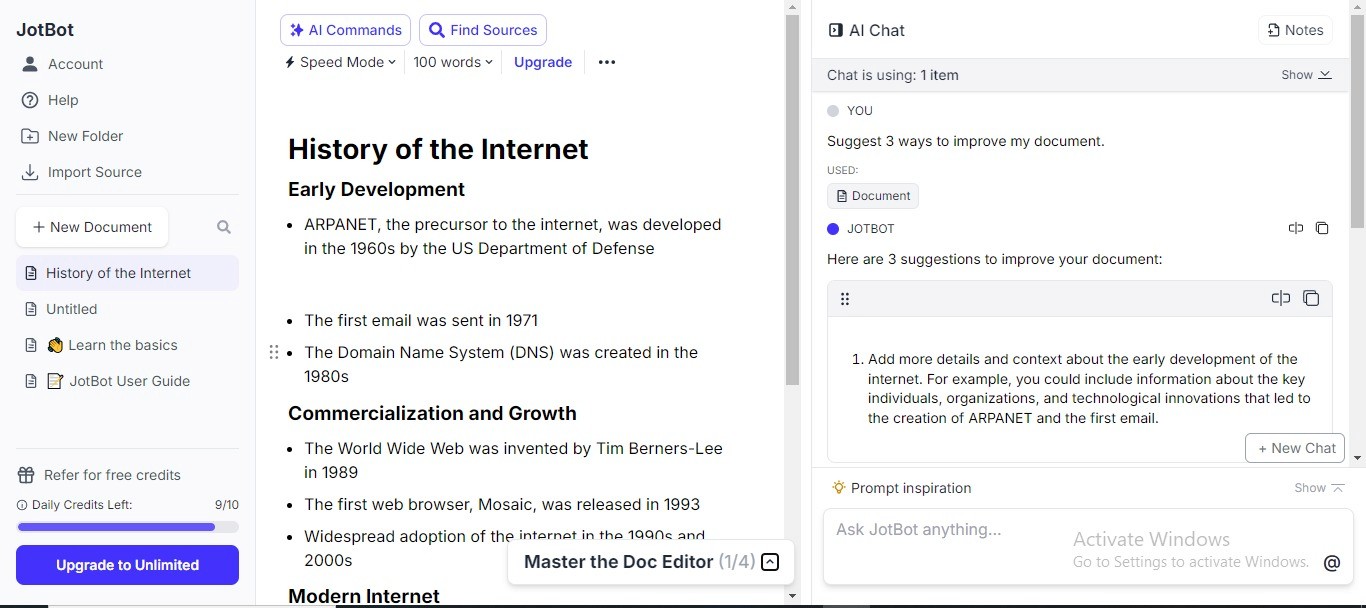
Jotbot: Your Research Co-Pilot
Consider having all your research materials in one place, effortlessly organized. Jotbot lets you do just that. It centralizes your notes, citations, and references, freeing you from the chaos of juggling multiple documents. Ever tried collaborating on a research project? Jotbot has you covered there, too. It makes teamwork a breeze, allowing you to share documents and communicate efficiently with your peers.
AI That Listens and Learns
If you've ever struggled to keep up with a fast-paced lecture or interview, Jotbot’s transcription feature is a game-changer. It automatically converts audio and video into text, saving time and sanity. And when you’re staring down a mountain of information, Jotbot’s summarization tools distill the essence of your documents so you can focus on what matters.
The Ultimate Source Detective
Looking for sources can be tedious, but Jotbot makes it easy. It scours many databases, academic journals, books, and websites to find your needs. And when you’ve got your sources, Jotbot handles citations like a pro, ensuring they’re accurate and consistent. No more citation headaches here.
Writing Made Effortless
Writing can be tricky. Jotbot makes it more accessible. Whether you need help generating an outline or writing entire sections, it’s there for you. It can even spark new ideas and perspectives by analyzing your research materials. It’s like a writing coach cheering you on by your side.
Works Well With Others
Jotbot doesn’t work alone; it plays well with others. It integrates seamlessly with other tools, like reference management software and citation managers, to streamline your workflow. There is no duplication of effort here.
Frequently Ask Questions (FAQ) On Best AI Tool For Research

What factors should I consider when choosing an AI tool for research?
Start by pinpointing what you need the AI tool to do. Are you looking to analyze data, process natural language, or train machine learning models? It could be a mix. Knowing your goals will help you find a tool that aligns with your needs. This step ensures you're not sidetracked by features you don't need.
Assess Your Data Needs
What kind of data are you working with? Is it structured, like spreadsheets, or unstructured, like social media posts? The size and complexity matter, too. Different AI tools excel with other data types. Select one that can handle your specific requirements for the most efficient results.
Consider Your Budget
Think about how much you're willing to spend. Costs can include licensing fees, maintenance, and possibly cloud computing expenses. Some tools are free, but others require a subscription or one-time payment. Balancing cost with functionality is critical to making an intelligent choice.
Prioritize Ease of Use
If you need to become a tech whiz, look for user-friendly options. Search for tools with intuitive interfaces and clear instructions. Good documentation can make a big difference, especially if you learn as you go. You want a tool that helps, not hinders, your research.
Check Integration Capabilities
You likely have other tools or software you already use. Ensure your new AI tool can integrate smoothly with them. This will help you keep your workflow efficient and prevent unnecessary task duplication. A cohesive digital ecosystem is more productive.
Start Writing for Free With Jotbot’s Source Finder
Jotbot is your personal document assistant and source finder. It handles AI note-taking, video summarizing, citation finding, and even writes essays. Over 500,000 writers, students, and researchers worldwide use Jotbot to write more, better, and faster.
Write more intelligently, not harder, with Jotbot’s AI writing assistant. Start finding sources for free with Jotbot's source finder today. Sign in with Google and get started in seconds.
Are there any free AI tools available for research?
Are you looking for free AI tools to kickstart your research? You're in luck. There are plenty of options, especially for individuals and minor projects. These tools can help you with natural language processing and machine learning tasks. Let's take a look at some of the best ones.
Google Colab: Run Python Code in the Cloud
Google Colab is a cloud-based platform that lets you run Python code, including machine
learning models. With access to powerful GPUs and TPUs, it's perfect for complex research tasks, and it's free!
Hugging Face Transformers: Pre-Trained NLP Models
If you're working with text, you'll love Hugging Face Transformers. This library offers state-of-the-art natural language processing models, including pre-trained models for tasks like text classification, question answering, and machine translation.
TensorFlow Lite: Deploy Models on Mobile Devices
Do you need to deploy your models on mobile or embedded devices? TensorFlow Lite is a lightweight version of TensorFlow optimized for devices with limited resources. It's an excellent choice for mobile developers and researchers alike.
RapidMiner Studio: Data Mining and ML Platform
RapidMiner Studio is an accessible data mining and machine learning platform with a user-friendly interface. It's great for researchers with limited technical expertise who want to analyze data and build models.
OpenAI's API: Access Powerful Language Models
OpenAI's API provides access to powerful language models like GPT-3. It can be used for a variety of research tasks, including text generation, summarization, and translation.
How can I ensure that the results I obtain from AI tools are accurate and reliable?
How do you think AI models perform well? They rely on quality data. Ensuring your data is accurate and complete is crucial. It’s like building a house with sturdy materials. If your data is flawed, your results will be too. So, double-check that your data reflects your research question. This step can save you from a world of headaches later.
Evaluate Model Performance
Once you’ve sorted your data, you need to evaluate your AI model’s performance. Use metrics and techniques that fit your specific project. This step is like taking a car for a test drive before buying it. You want to know how it performs under different conditions to ensure accuracy and reliability.
Embrace Cross-Validation
Overfitting is a significant issue in AI research. Cross-validation helps you assess how well your model generalizes to new data. Think of it as a rehearsal before the big performance. By testing on unseen data, you can prevent overfitting and improve your model’s performance.
Combine AI with Human Judgment
AI tools are powerful, but they’re not infallible. Combining AI-generated results with human expertise ensures meaningful and relevant conclusions. Consider it like teaming up with a friend for a big project. You both have strengths that can complement each other for the best outcome.
Ensure Transparency and Explainability
Understanding how your AI tool works is crucial for identifying potential biases or limitations. It’s like knowing how a magic trick is done. You can see the flaws and ensure the results are trustworthy. Being transparent and explainable helps build trust in your research.
Regularly Update Tools
AI tools evolve rapidly. Keeping them up-to-date ensures you use the latest and most efficient versions. It’s like updating your phone’s software—new updates often fix bugs and improve performance. Staying current helps you get the most out of your AI tools.
Consult with Experts
If you’re unsure about using AI tools or interpreting results, don’t hesitate to consult with experts. They can provide guidance and support to help you get the most out of your research. Think of them as your trusty guide through unfamiliar territory. They can help you avoid pitfalls and make the most of your journey.
Write Smarter With Jotbot's Source Finder — Start Writing for Free Today
Jotbot is an advance for anyone wrestling with research papers or essays. Picture this: you’re staring at a blank page, frantic for sources. Jotbot swoops in like a trusty sidekick, finding sources for you in no time. Do you need notes? Jotbot’s got you.
Are you summarizing videos? Done. Are you crafting outlines? Check. And if you’re really in a pinch, Jotbot can even whip up an entire essay. This tool is your new best friend for writing faster and wiser. Join half a million other writers who have discovered the magic of Jotbot. Sign in with Google, and you’re off to the races.
Related Reading
• Elicit AI
• Scholarcy AI
• Scisummary
• AI Research Tools
• Sourcely
• Consensus AI Tool
• Mendeley Alternatives
• Cite This For Me Alternative
• Scholarly Sources Examples
• Academic Sources Examples
• How to Find Scholarly Sources
• List of Scholarly Sources
• Examples of Peer Reviewed Sources
• How to Cite a Book
• How to Cite an Article
• How to Cite
• How to Cite a PDF
• How to Cite Multiple Authors MLA
•How to Cite a Website in Text
• How to Cite a Lecture
• How to Cite ChatGPT
Write more, better, faster.
Your personal AI document assistant












